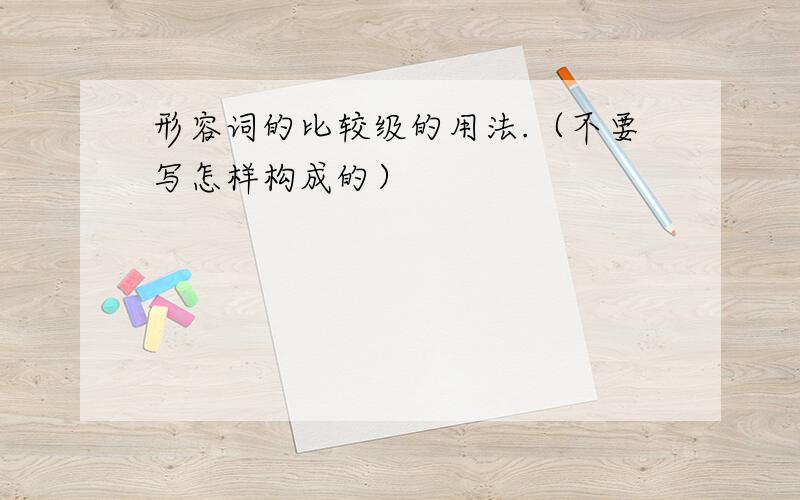形容词的比较级的用法.(不要写怎样构成的)
来源:学生作业帮助网 编辑:作业帮 时间:2024/04/20 02:51:02

形容词的比较级的用法.(不要写怎样构成的)
形容词的比较级的用法.(不要写怎样构成的)
形容词的比较级的用法.(不要写怎样构成的)
比较级一般都是在单词后加er或者前加more,比如:
fast——faster(快,更快),beautiful——more beautiful(漂亮,更漂亮)
以y结尾的形容词呢,就是去y加ies,我再举例:
easy——easier(简单,更简单)
我这样说你能理解吗?我按你要求回答了.
形容词、副词的比较级的用法既是该类语法的重点也是难点。研读历届高考题不难发现,高考对形容词和副词比较级的用法的考查涉及到了多个方面。为了便于同学们学习,下面笔者就其用法的一些重要结构作一归纳并附以练习,以期同学们对此能熟练掌握。
1.“as+adj/adv+as或not so(as)+adj/adv+as.”句型。该句型常用来描述两个比较对象的程度上的相似或不同(即平时说的“等级比较和...
全部展开
形容词、副词的比较级的用法既是该类语法的重点也是难点。研读历届高考题不难发现,高考对形容词和副词比较级的用法的考查涉及到了多个方面。为了便于同学们学习,下面笔者就其用法的一些重要结构作一归纳并附以练习,以期同学们对此能熟练掌握。
1.“as+adj/adv+as或not so(as)+adj/adv+as.”句型。该句型常用来描述两个比较对象的程度上的相似或不同(即平时说的“等级比较和不等级比较”)。例如:
My computer is not so(as) expensive as yours.我的电脑不如你的贵重。
2.“as many/few+可数名词复数+as”或“as much/little(少的)+不可数名词+as”。前者描述数目上的接近,后者描述量的相近。例如:
You may borrow as many books as you can.你能借多少书就借多少。
“Drink as much water as you can.”the doctor said to him.医生对他说到:“你要尽可能的多喝些水。”
3.“主语+比较级+than any other…”结构表示:主语所描述的事物比其他任何一个都……比较级形式表示最高级含义。例如:
Li Ming is much cleverer than any other student in their class.李明是他们班中最聪明的学生。
注意:若比较范围不同,than后应用“any+可数名词的复数形式+其他”。例如:
China is larger that any countries in Africa.中国比非洲上的任何国家都大。
4.诸如not,never之类的否定词与形容词或副词的比较级连用,表示最高级含义。意为:再没有比…更…的了。例如:
It is not a better idea.这是再好不过的一个办法了。
I have never heard such an interesting story.我从来没有听过比这更有趣的故事了。
5.“形容词+to”结构也可表示比较含义。例如:
This kind of car is superior in quality to that.这种汽车的质量比那一种好得多(superior to意为:优于;胜过。)
Li ping is three years senior to Liu Gang.李平比刘刚大三岁。(senior to意为:年长于;资格老于;地位高于。)
6.“no+比较级+than”结构表示对两个比较对象都进行否定(可由neither…nor…结构来改写)。例如:
I’m no more foolish than you.我们俩都不傻。(相当于Neither I nor you is foolish.)
7.“not more+比较级+than”结构表示在程度上前者不如后者。例如:
This book is not more interesting than that one.这本书不如那本书有趣。(相当于The book is less interesting than that one.)
8.“形容词比较级+than+形容词”,意为:与其…倒不如…。例如:
Jack is much harder than clever.与其说杰克聪明,倒不如说他学习用功。
9.would rather…than, prefer…to…, prefer to do…rather than…这三个句型表示“宁愿…而不愿…;喜欢…胜过…;宁愿做…而不愿做…”含义。虽无比较级形式,但表示比较级含义。例如:
She would rather die than give in.她宁死不屈。
He preferred to go out rather than stay home.他宁愿出去也不愿呆在家里。
10.“The+比较级…,the+比较级…”。该结构意为“越…,越…”。例如:
The more difficult the questions are, the less likely he is able to answer them.问题越难,他回答出来的可能性就越小。
11.what有时也可以表示“比较”关系,说明两种事物的相同或相似性。what的该种用法常用于书面语,用来加强修辞效果,含有比喻含义,相当于as,意为“好比…;正如…;就像…一样”。what的该类用法共有3种情况:
(1)A is to B what C is to D
Twelve is two what twenty-four is to four.十二比二就等于二十四比四。
(2)what C is to D, A is to B
What food is to the body, a book is to the mind.书籍对于思想犹如食物对于身体。
(3)what C is to D, that A is to B
What the gun is to a soldier, that the pen is to a writer.作家的笔犹如战士的枪。
刚刚上中学的话
下面是比较基础的形容词比较级用法
1. 比较级的基本用法
英语中的形容词和副词有三个等级,即原级、比较级和高最级。比较级主要用于两者比较,最高级主要用于多者比较。
Our teacher is taller than we are.
我们老师的个子比我们的高。
It is warmer today than it was yesterday.
今天的天气比昨天暖和。
This picture is more beautiful than that one.
这张照片比那张照片漂亮。
This meeting is less important than that one.
这次会议不如那次会议重要。
The sun is much bigger than the moon.
太阳比月亮大得多。
2. 不能使用双重比较等级
即构成比较级时不能既加词尾-er,又在其前加more;构成最高级时不能既在词尾加-est,又在其前加most,如不能说more better, most earliest 等。不过“比较级+and+比较级”这样的形式却完全可用。如:
I am getting fatter and fatter. 我越来越胖了。
We’re going more and more slowly. 我们越走越慢了。
3. 使用比较等级要注意合乎逻辑
请看两组正误句:
我的电脑比她的贵。
误:My computer is more expensive than her
正:My computer is more expensive than hers.
析:从逻辑上说,应该是my computer 与 her computer 作比较,而不是my computer 与her 比较。上面正句中的hers=her computer。
上海人口比中国其他城市的人口要多。
误:The population of Shanghai is larger than that of any city in China.
正:The population of Shanghai is larger than that of any other city in China.
析:从逻辑上说,Shanghai在China范围内,或者说Shanghai也是China范围内的一个城市,若不用other,则句意为“上海的人口比中国任何城市的人口都多”,
4. 比较级和最高级的常见修饰语
比较级的修饰语:常见的有far, even, still, a lot, lots, a great deal, a bit, rather, three times, any, no, very much 等。如:
Japanese is much [far] more difficult than English. 日语比英语难多了。
She felt a great deal more comfortable now. 她现在感觉舒服多了。
He works hard, but she works still harder [harder still]. 他工作很努力,但她工作更努力。
最高级的修饰语:常见的有(by) far, much, nearly, almost, not quite, by no means, very, second, next 等。如:
His illness is far more serious than we thought. 他的病比我们想像的要严重得多。
China’s population is by far the largest of any country. 中国是全世界人口最多的国家。
I want to give my children the very best education I can afford. 我想给我孩子力所能及的最良好的教育。
The Yellow River is the second longest river in China. 黄河是中国第二长河流。
注:very不能修饰比较级,却可修饰最高级,但它与一般的修饰最高的副词有所不同,即它要放在最高级前定冠词之后,而不是之前(另外,second, third, next等也要入在定冠词之后)。
收起